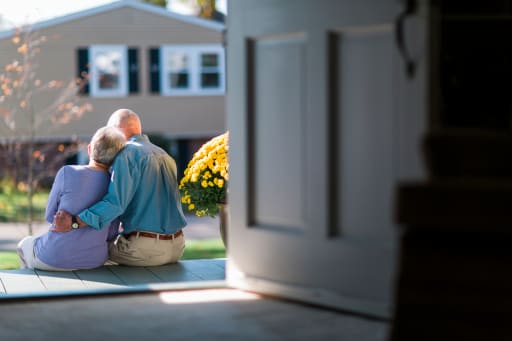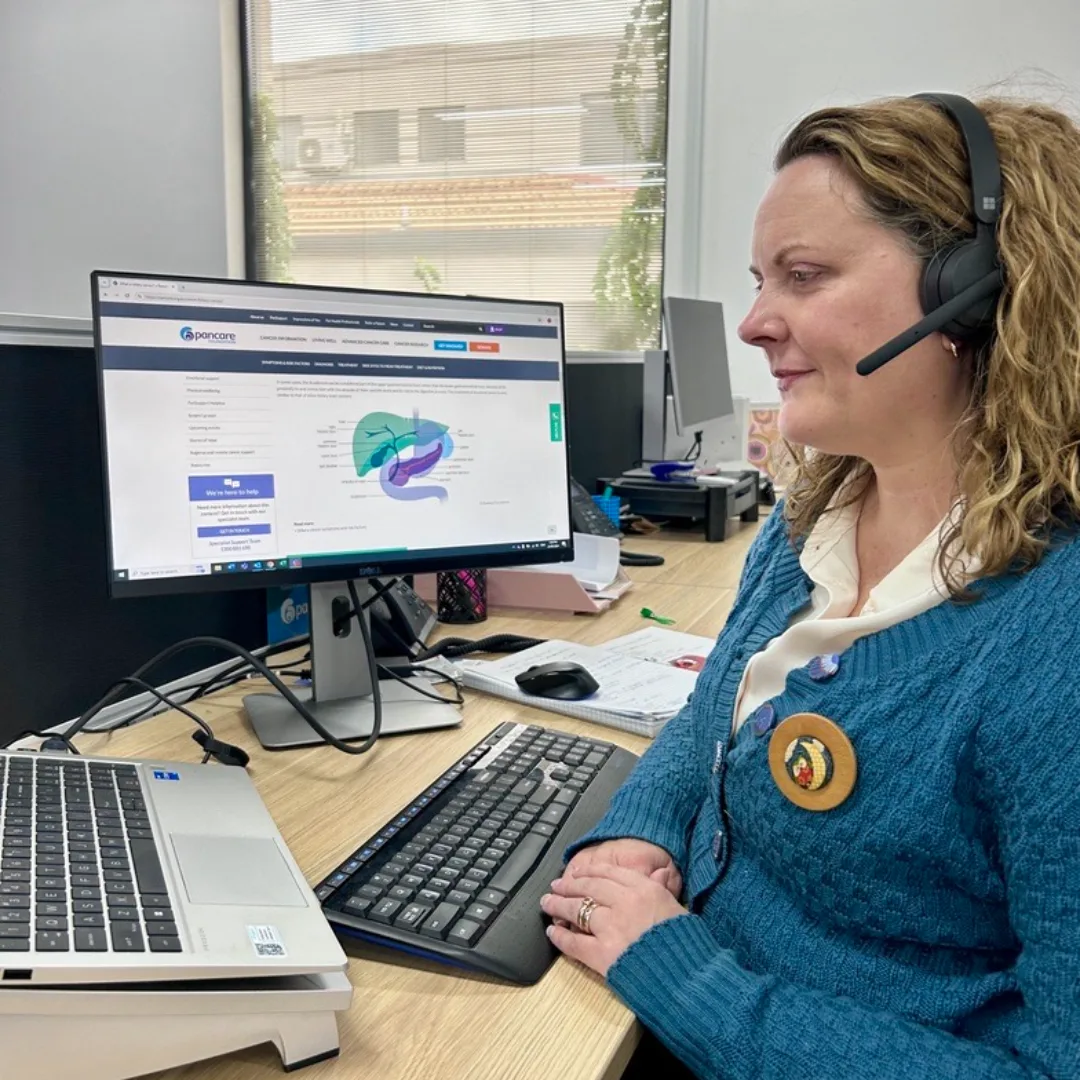Information for families and carers
Being a carer for someone with cancer is one of the most important roles you can have, but it's also one of the most challenging.
If you’re a partner, family member, or close friend providing care and support to someone living with cancer, this section is for you.
Caring can involve many things, from helping with personal care and managing medicines to providing emotional support and accompanying them to appointments. The amount and type of care needed will change throughout the cancer journey.
This section provides practical tips for caring, information about looking after your own wellbeing, and tips for supporting family and children through this time.

Practical caring tips
Caring for someone with cancer involves many practical tasks. This section provides tips to help you feel more confident and capable in your caring role.
Understanding their care needs
The care needs of a person with cancer will change over time.
Early on after their diagnosis, you may help with transport, understanding medical information and offering emotional support.
During treatment, help might include shopping, cooking, cleaning, and managing medicines and side effects.
As the disease progresses, care often becomes more hands-on, helping with washing, dressing, mobility, and providing companionship.
Accompanying them to appointments
Going to medical appointments together is helpful. You can be an extra pair of ears to remember what's said, ask questions, take notes, provide emotional support, and help explain symptoms or concerns.
Tips for appointments:
- Prepare beforehand. Write down symptoms, questions, and concerns. Take the medicine list.
- Take notes during the appointment or ask if you can record the conversation (with permission).
- Ask for clarification if you don't understand something. Doctors are used to explaining things in different ways.
- Don't be afraid to speak up if the person isn't able to explain something clearly.
- Ask for written information or reliable websites where you can learn more.
Communicating with healthcare professionals
Good communication with the healthcare team makes caring easier.
Don't be afraid to ask questions or ask for explanations if you don't understand something.
Share your concerns. If something doesn't seem right, speak up. You know the person better than anyone.
Make sure you have contact numbers for the healthcare team and know when to call. Know what symptoms need urgent attention.
If you're struggling with caring tasks, tell the healthcare team. They can arrange additional support or show you easier ways to do things.
Managing medicines
People with cancer often take multiple medicines. Keeping track of them all can be challenging.
Tips for managing medicines:
- Keep a medicine list. Write down the name of each medicine, what it's for, the dose, when to take it, and any special instructions. Update this list whenever medicines change. Take it to all appointments.
- Use a pill organiser or dosette box. These have compartments for different times of day and days of the week. Fill it once a week so you know medicines are ready.
- Set reminders. Use phone alarms or medication reminder apps to help you remember when medicines are due.
- Keep medicines organised. Store them safely in one place. Keep them in their original containers with labels.
- Understand what each medicine is for. This helps you spot if something isn't working or causes side effects.
- Know which medicines are essential and which can be missed if the person feels too sick to take them. Check with the healthcare team.
- Watch for side effects. Report any new or worsening symptoms to the healthcare team.
- Order repeat prescriptions before medicines run out. It can take several days to get new medicines.
Helping with eating and nutrition
Many people with stomach cancer struggle with eating. As a carer, you can help in several ways.
Tips for providing nutritional support:
- Prepare small, frequent meals rather than large ones. Foods that are high in energy and protein are best. Make foods the person enjoys and asks for - now isn't the time to worry about balanced diets.
- Don't force eating or drinking. Pressuring someone to eat often makes things worse and can create conflict. Offer food, but respect if they decline.
- Try nutrition supplement drinks if solid food is difficult. Keep several flavours available as tastes change.
- Make mealtimes pleasant. Eat together if possible. Avoid talking about how little they're eating.
- Understand that decreased appetite is part of the disease. It's not your fault if they're not eating well.
Helping with personal care
Personal care can include helping with washing and bathing, getting dressed, using the toilet, and getting in and out of bed. Providing personal care for someone you love can feel awkward at first, especially if it involves intimate tasks. This is normal.
Tips for personal care:
- Maintain dignity and privacy as much as possible. Close curtains or doors. Keep them covered with towels during washing. Let them do as much as they can for themselves.
- Ask how they'd like things done. They know their body and preferences best. Explain what you're going to do before you do it.
- Take your time. Rushing makes things harder and more stressful for both of you.
- Make sure the bathroom is warm and safe. Use non-slip mats. Consider equipment like shower chairs, raised toilet seats, or grab rails.
- Get advice from nurses or occupational therapists. They can show you safe techniques for moving and handling. They can also suggest equipment that might help.
When to seek help
You can't do everything alone. It's important to accept and ask for help. Let friends and family know specific ways they can help. For example, doing shopping, preparing meals, mowing the lawn, sitting with the person while you rest, or driving to appointments.
Home care services can provide professional help including nursing care at home, help with personal care, domestic help, and equipment provision. Ask the healthcare team or social worker about services available in your area.


Looking after yourself as a carer
Looking after yourself isn't selfish - it's essential. You can't care well for someone else if you're exhausted, unwell, or overwhelmed. This section helps you understand the importance of self-care and how to maintain your own wellbeing whilst caring.
Why self-care matters
Caring for someone with cancer can be physically, emotionally and financially demanding. It’s normal to feel tired, worried, or stretched thin.
Without rest and support, carers can burn out or become unwell themselves.
Looking after your body, mind and relationships helps you care better and for longer .

Looking after your body
- Try to eat regular, healthy meals, even if they’re simple. Keep easy snacks on hand.
- Rest whenever you can. Nap when your loved one naps, and go to bed early if you need to.
- Stay active with short walks or light exercise. Moving helps reduce stress and improve sleep.
- See your GP for your own health checks and let them know you’re a carer because extra support is available.
- If you help with lifting or moving, ask a nurse or physiotherapist to show you safe techniques and use any equipment provided.
Looking after your emotions
- Caring can bring up many emotions, such as sadness, guilt, anger, even relief. These are all normal.
- Talk about how you feel with friends, family, a counsellor or other carers. You don’t have to keep everything inside.
- Be kind to yourself. Good enough really is good enough. Take short breaks when you can, even just a few minutes with a cup of tea or a walk outside.
- If you feel constantly down, anxious or overwhelmed, speak with your GP or a counsellor.
Taking breaks
- Regular breaks help prevent exhaustion. Ask family or friends to sit with your loved one while you rest or go out.
- Hospices, hospitals and community services can provide respite care, where trained carers help for a few hours or days.
- Even small breaks, like listening to music, reading, or meeting a friend, can recharge you.
Relationships and connection
- Caring can strain relationships or make you feel isolated. Try to keep in touch with friends, even by phone or text.
- Tell people what you need. Most want to help but don’t know how.
- Make time for small moments with your partner, children or friends.
- If tension builds, consider family counselling or joining a carer support group to share experiences.


Money and work
- Caring can affect income and increase expenses.
- You may be eligible for Carer Payment or Carer Allowance through Services Australia, or help with travel and medical costs.
- If you’re struggling, speak with a financial counsellor (call the National Debt Helpline 1800 007 007) or your social worker.
- Talk with your employer about flexible work or carer’s leave if you’re still working.
When caring feels too much
If you feel constantly exhausted, angry, or hopeless, or can’t manage daily tasks, it’s a sign you need more support.
Tell your healthcare team, GP or social worker. Respite care, counselling, and community services can all help you recover and continue caring safely.
Where to get support
You don’t have to do this alone. Support is available:
- Pancare Foundation runs monthly online support groups for carers
- Carer Gateway – 1800 422 737 or carergateway.gov.au for counselling, respite and advice
- Carers Australia – links to state-based carer support
- Cancer Council – telephone support 1300 755 632
- Your GP or hospital social worker can help arrange local services
Support for families and children
A cancer diagnosis affects the whole family, not just the person with cancer. This section provides information about supporting family members, particularly children, when someone in the family has cancer.

Impact on the family
A diagnosis of cancer can change family life in many ways.
- Daily routines change. The person with cancer may not be able to do things they used to do. Someone else has to take on their roles and responsibilities.
- Family roles shift. Adults may take on new responsibilities. Children may be asked to help more or may feel left out. The person with cancer may feel they've lost their role in the family.
- Emotions run high. Everyone in the family may feel worried, sad, scared, or angry. Family members may have different ways of coping, which can cause tension.
- Time together changes. Much time may be spent at appointments or in hospital. Family activities may reduce. Quality family time becomes more precious.
- Relationships can be tested. Stress can bring families closer together or can create conflict.
Supporting your partner
If your partner has cancer, you are dealing with the dual role of being a carer and being a partner. This is particularly challenging.
Tips for maintaining a loving and supportive relationship
- Keep communicating. Talk about feelings, fears, and hopes. Share the experience rather than trying to protect each other.
- Make time for your relationship when possible. Even small moments of connection matter. Hold hands, share a cup of tea, watch something together.
- Be patient with each other. You're both under enormous stress. Try to be kind even when things are difficult.
- Accept that your relationship will change. Intimacy may change. Roles may shift. This doesn't mean the love is gone.
- Seek couples counselling if your relationship is struggling. Many cancer support services offer this.
Supporting children and young people
When someone in the family has cancer, children and young people need honest, age-appropriate information. Keeping secrets doesn't protect children, it often makes them more worried.
Tips for talking to children about cancer
- Use simple, honest language. Avoid medical jargon, but do use words like ‘cancer’ and ‘chemotherapy’. Children will hear these words and need to know what they mean.
- Give information in small chunks. Answer questions as they come up. You don't need to tell them everything at once.
- Reassure them it's not their fault. Children often think they've caused bad things to happen. Make it clear cancer is not caused by anything anyone did or thought.
- Let them know what's happening and what will change. Explain how their daily life might be affected.
- Encourage questions. Answer honestly. It's okay to say "I don't know" to some questions.
- Reassure them they'll be looked after. Children worry about who will care for them.
When the prognosis is poor
If the cancer is advanced and the prognosis is poor, children need to know this too. The conversation will depend on their age, but honesty is important.
You might say: "The doctors have tried everything, but the medicine isn't working well enough. Mum is not going to get better."
Young children may not fully understand death. They may ask the same questions many times. Be patient and answer honestly each time.
Older children and teenagers will understand more. They may be very distressed. Give them space for their feelings whilst providing reassurance that they'll be supported.
Let them know what will happen. Where will the person be cared for? Will they die at home or in hospital? What happens after someone dies?
Reassure them they'll be looked after. Knowing who will care for them provides security.
Supporting children through bereavement
If the person with cancer dies, children will grieve. Children grieve differently to adults. They may seem fine one moment and very upset the next. They may continue playing and doing normal activities – this doesn't mean they don't care.
Let children go to the funeral if they want to. Explain beforehand what will happen. Give them the choice but don't force it.
Answer questions about death honestly. Use clear language like ‘died’ rather than ‘gone to sleep’ or ‘passed away’ which can confuse young children.
Keep routines and structure. This helps children feel secure during a chaotic time.
Watch for signs of complicated grief. If a child's distress doesn't ease over time or gets worse, seek professional help.
Support services for children and young people
- Canteen provides support for young people (12–25 years) when someone in their family has cancer or when they themselves have cancer. Canteen offers counselling, support groups, online support, and camps and activities. Visit canteen.org.au or call 1800 226 833.
- School counsellors can provide support at school. Talk to your child's teacher about what's happening so they can watch out for the child.
- Child psychologists can provide specialist support if a child is struggling. Ask your GP for a referral.
- Grief counselling services support children after a death. Many bereavement services have programmes specifically for children.
Want to talk?
Speak to an upper GI cancer nurse or counsellor, we're here to provide you with the support you need. Support available to anyone impacted by upper gastrointestinal (GI) cancer. Monday to Friday, 9am-5pm.
